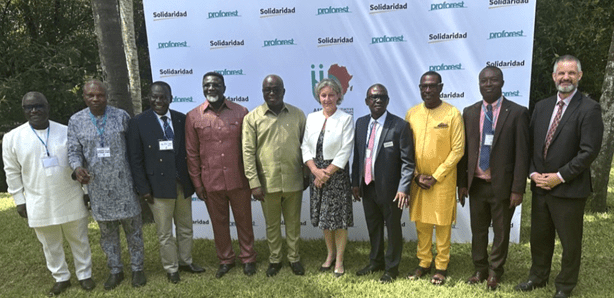By Ebenezer Chike Adjei NJOKU
Minister of Food and Agriculture Eric Opoku has called for stronger cooperation between government, the private sector and civil society to transform the country’s agricultural commodity production while preserving forest resources.
Speaking at the 9th African Sustainable Commodities Initiative (ASCI) Regional Meeting opening in Accra yesterday, Mr. Opoku argued that public-private partnerships (PPPs) remain essential to meeting both environmental standards and economic development goals.
“The road ahead requires stronger cooperation, greater transparency and an inclusive approach that respects human rights and indigenous knowledge,” the minister told delegates from over ten African nations gathered at the conference.
The meeting comes as Ghana positions itself as a regional leader in sustainable commodity production following recent international recognition, especially under the African Continental Free Trade Area (AfCFTA).
Already, conservative estimates suggest that the continent’s food and agriculture market alone has the potential to increase from US$280billion a year in 2023 to US$1trillion by 2030.
Ghana, which became a member of the Tropical Forest Alliance (TFA) Africa Palm Oil Initiative (APOI) in June 2015 and subsequently a partner in October 2015, has been instrumental in developing regional frameworks for responsible agricultural production.
The country hosted the first TFA 2020 APOI Regional Workshop in 2016, which led to the Marrakech Declaration on Oil Palm Development adopted at COP-2022.
Mr. Opoku highlighted Ghana’s Tree Crop Development Authority (TCDA) as a concrete example of institutional innovation designed to balance agricultural expansion with environmental protection.
“This institution plays a pivotal role in regulating and supporting the sustainable growth of priority crops such as oil palm, rubber, coconut, mango, cashew and shea. By promoting best practices, enforcing sustainability standards and fostering market access for smallholders, the TCDA is helping to reshape the future of Ghana’s non-cocoa tree crop landscape,” he explained.
The minister also addressed historical challenges in agricultural development, noting that past approaches often prioritised short-term gains.
“We have inherited systems that often prioritised short-term gains over long-term sustainability – systems that saw vast forest lands converted into farms without consideration for biodiversity, ecosystems or the rights of local communities. This must change. And I am proud to say it is changing,” he stated.
The minister’s views were reinforced by Andy Osei Okrah, Chief Executive-TCDA – who noted that through public-private partnerships and alignment with ASCI principles, efforts are underway to ensure the tree crop sector promotes economic transformation while also protecting forests, water resources and rural communities.
“We are entering a new era for the tree crop sector – one in which prosperity and sustainability go hand in hand. We are confident that our efforts will not only boost the economy but also preserve our natural resources and uplift rural communities,” he said.
Dr. Ishmael Nii Amanor Dodoo, Head of Innovative Finance at the 24-hour Economy and Accelerated Export Development Secretariat, highlighted the need for partnership in his address… stating the economic transformation potential of sustainable production.
“Our strategic partnership with the TCDA will help to come up with a strategic vision of how to deal with agroecological problems,” Dr. Dodoo said.
“And our strategic partnership with the Ministry of Agriculture will help us to look at how we can create sustainable production of agricultural products and accelerate their export prices,” he added.
The meeting’s objectives include facilitating knowledge exchange among the ten ASCI member-countries; reviewing research findings on sustainable supply chains; and showcasing how climate finance can be leveraged to improve environmental outcomes and farmer incomes.
Eric Amoako Agyare, Country Representative for Solidaridad West Africa in Ghana, highlighted concrete examples of technology transfer already underway through public-private collaboration.
“Solidaridad has piloted two artisanal oil palm processing mills equipped with modern technology to reduce methane emissions and increase the palm oil extraction rate as part of Ghana’s climate mitigation efforts under Article 6.2 of the Paris Agreements,” Mr. Agyare explained.
He observed that the innovation could serve as a model for other African nations, particularly those aiming to tap into climate finance and deepen their participation in global sustainability initiatives.
Abraham Baffoe, Group Director-Proforest which facilitates the ASCI, noted that the participating countries – Sierra Leone, Liberia, Cote d’Ivoire, Ghana, Nigeria, Cameroon, Central African Republic, Democratic Republic of Congo, Gabon and the Republic of Congo – collectively account for 25 percent of the world’s tropical forest and 75 percent of Africa’s forests.
“government cannot do it by itself. We all have to come together and that is why we are in this room,” Mr. Baffoe said, stressing the need for collaborative action.










